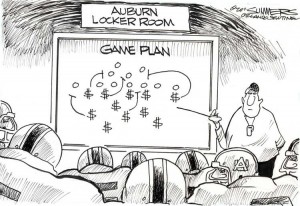I remember very clearly the first time I wondered about college athletes being paid. I was eleven years old and at my first college football game ever with my father. We were in the midst of tens of thousands of fans, hundreds of press members, and dozens of television cameras. I was enthralled by the spectacle and asked my father how much the players were getting paid. “Nothing,” he said, much to my astonishment. How could that be? Certainly the players must be receiving something to play.
Fast forward about a decade. College football superstar Reggie Bush of the University of Southern California (USC) has just won the Heisman trophy (college football’s most prestigious award). The award seemed an appropriate punctuation to his spectacular and honest career. That is, until 2010 when NFL agent Lloyd Lake sued Bush for failure to repay $290,000 worth of incentives that he gifted Bush while attending USC. Once the NCAA learned of the allegations, they swiftly penalized USC, forcing the school to vacate their last 2 wins of 2004 (including the national championship) and all of their wins in 2005. The NCAA cited Bush’s superstar status and USC’s failure to monitor him closely as justification enough for those stiff penalties. The case between Lake and Bush has since been settled and Bush returned his Heisman trophy in September 2010. Sadly, his scandal is not a lonely one.
The most recent NCAA football champions, the Auburn Tigers, had a scandal surface last March where players stated they received money directly from coaches, and earned cash handshakes from boosters for their performance in games. Former Auburn player Stanley McGlover says he once received $4,000 after his 4 sack performance against arch-rival Alabama.
Last week former University of Miami booster, Nevin Shapiro confessed to supplying Miami players with cash, girls, entertainment, and gifts over a period of 8 years—a major NCAA violation. Because of Shapiro’s testament the University has since suffered a harsh blow to its reputation and is currently awaiting its penalty from the NCAA.
There is no question that NCAA athletes are getting paid (sorry dad!), the question is should they? Former NFL coach and current NCAA coach Steve Spurrier thinks so. He believes that players should receive $300/game–a reasonable sum. Over the course of 4 years it wouldn’t even come close to the lavish $290,000 that Bush received during his college career; however, the current rules have a precedent—no paying whatsoever—and if that precedent were to be broken, well, who knows how long it would be before players saw over $1,000/game, an amount potentially being paid to kids already receiving a free college education.
Lets put this in perspective. Imagine a talented athlete from California and an equally talented poet from the Bronx. Is it fair that one of these equally talented people is rewarded significantly more for their specific talent, rewarded even, to the point of absurdity? ($4,000 a game.) Of course not. I understand, too, that the NCAA makes billions of dollars from their student athletes. Think that’s a rip-off? You may be right. Think that’s simply part of the agreement? You may also be right. I personally side with the latter, and to the NCAA I say: keep it amateur.

